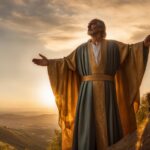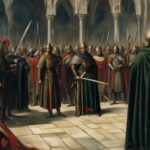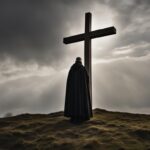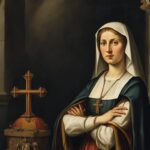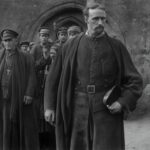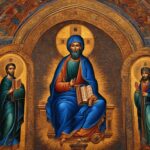St. Thomas More, a Catholic saint and religious figure, is celebrated as a martyr, lawyer, philosopher, and patron saint. His life exemplifies the core values of Catholicism, embodying holiness, faith, and Christian spirituality. Throughout his journey, More remained true to his convictions, even at the cost of his own life. His unwavering integrity and commitment to the law continue to inspire and influence individuals within and outside of the Catholic faith.
Key Takeaways:
- St. Thomas More is a Catholic saint and martyr known for his integrity and commitment to the law.
- His early life and background shaped his strong sense of faith and morality.
- Despite considering religious life, More followed a path of marriage and family while maintaining deep commitment to his faith.
- More had a distinguished career as a lawyer and politician, championing justice and advocating for the rights of the marginalized.
- His spiritual life and philosophy emphasized the pursuit of truth, reason, and ethical behavior.
Early Life and Background
In this section, we will explore the early life and background of St. Thomas More, a prominent figure in history known for his unwavering integrity and commitment to the law.
St. Thomas More was born in 1478 in London, England. Coming from a privileged background, he received a comprehensive education at Oxford University, which laid the foundation for his future endeavors.
More’s upbringing instilled in him a strong sense of faith and morality. His parents and teachers emphasized the importance of truth and justice, shaping his character and guiding his decisions and actions throughout his life. It was during these formative years that More’s commitment to upholding the principles of the law began to take root.
As we delve into St. Thomas More’s early life and background, we gain insights into the experiences that shaped his unwavering dedication to truth and justice.
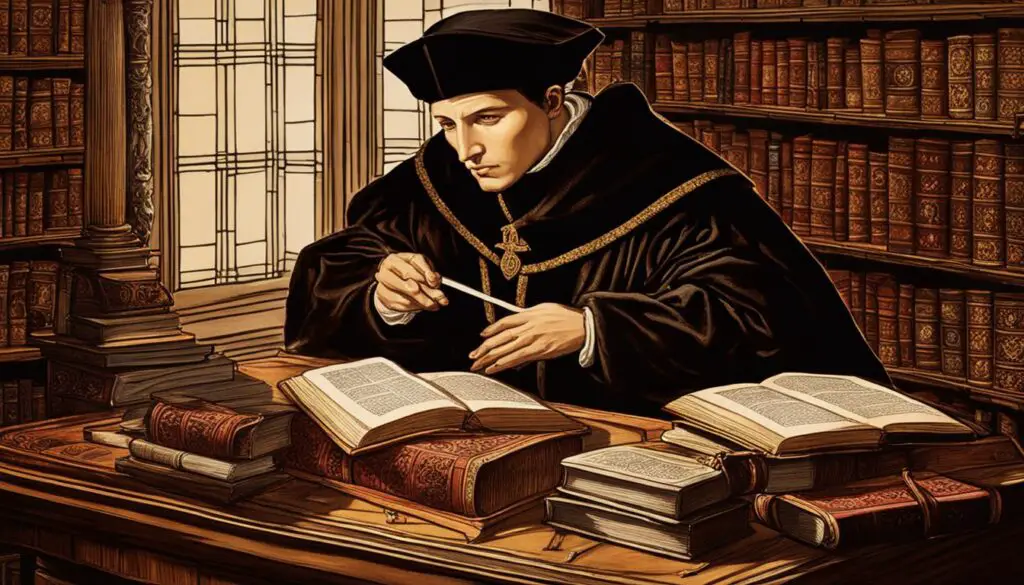
Call to Religious Life
Despite initial plans to pursue a career in law, St. Thomas More felt a calling to religious life. He considered becoming a monk and even spent time in a Carthusian monastery. However, he ultimately chose to follow the path of marriage and family life while maintaining a deep commitment to his faith. This decision would inform his approach to his legal and political career and would guide his actions in upholding Christian values.
St. Thomas More’s religious calling was a pivotal moment in his life. It was a decision driven by his unwavering faith and a desire to serve God in a unique way. Though he had a deep passion for the law and could have pursued a successful career in that field, More chose to prioritize his spiritual journey.
“And whereas I have utterly refused the order of priesthood and that kind of life for which I was then prepared, I considered that now God of His goodness had called me to another way.”
In his pursuit of religious life, More sought to explore a path rooted in devotion, prayer, and contemplation. His time at the Carthusian monastery allowed him to delve deeper into his faith and discern his true calling. Although ultimately deciding against monastic life, More remained committed to living a life of holiness and faith in the secular world.
By choosing to embrace marriage and family life, St. Thomas More found a way to integrate his religious calling into his everyday existence. He understood that the path to holiness was not limited to the confines of a monastery, but could be manifested through his actions and interactions with others.
St. Thomas More’s commitment to his faith and his dedication to upholding Christian values remained unwavering throughout his life. It was through his religious calling that he was able to infuse his legal and political pursuits with moral integrity and a steadfast commitment to justice.
As More upheld his religious calling, he embodied the idea that one’s faith should not be separate from their professional or personal life. Instead, it should act as a guiding force, shaping one’s actions and decisions, and inspiring others to live a life of faith and virtue.
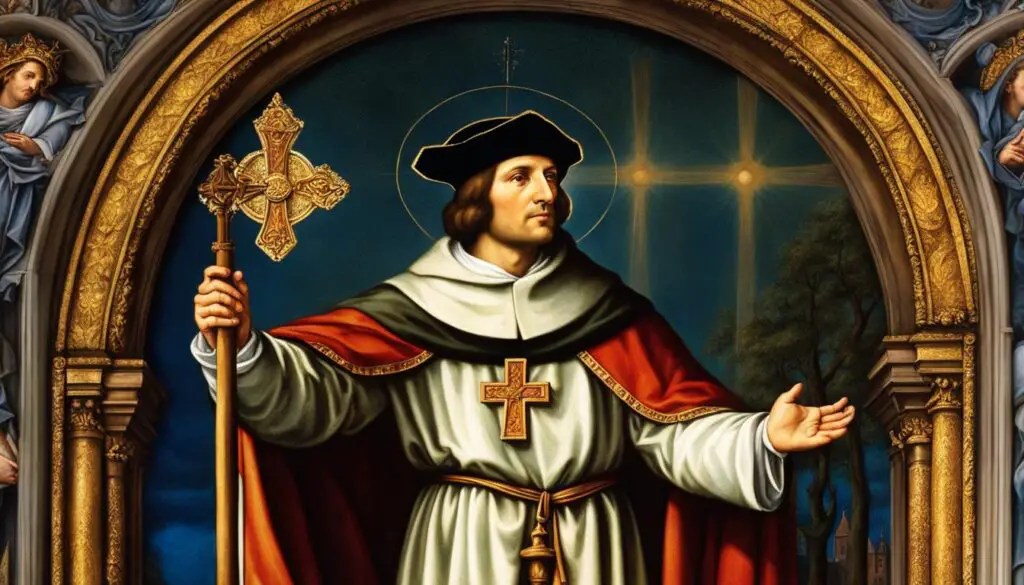
Living Out the Call to Faith
The decision to follow a religious calling is deeply personal and requires strong conviction. St. Thomas More’s choice to prioritize his faith while engaging in the world serves as a powerful example for individuals searching for guidance in their own spiritual journeys.
More’s commitment to his religious calling influenced the way he approached his work, family life, and interactions with others. He strove to live out his faith through his actions, treating even those who opposed him with respect and dignity.
“I die the King’s good servant, and God’s first.”
St. Thomas More’s unwavering faith and his willingness to sacrifice his own life rather than compromise his beliefs speaks to the depth of his religious calling. It is a testament to the power of faith and the courage it can inspire in the face of adversity.
By embracing his religious calling and integrating it into his life, St. Thomas More left a lasting legacy of integrity, steadfastness, and dedication to God. His example continues to inspire individuals to follow their own callings, whatever they may be, and to live out their faith with unwavering commitment.
Work
St. Thomas More’s work was marked by a remarkable dedication to justice and the welfare of society. As a highly esteemed lawyer and politician, he made significant contributions to the legal and political landscape of England.
“A lawyer without history or literature is a mechanic, a mere working mason; if he possesses some knowledge of these, he may venture to call himself an architect.”
More’s career reached its pinnacle when he served as the Chancellor of England, a position that showcased his legal expertise and intellectual prowess. In this role, he provided sound legal counsel to the King and played a crucial role in the governance of the country.
“The king’s good servant, but God’s first.”
More’s commitment to justice extended beyond the courtroom. He advocated tirelessly for the rights of the underprivileged and marginalized, striving to create a society where every individual was treated with fairness and dignity.
“If discrimination is the problem, justice is the solution.”
More’s approach to governance emphasized ethical leadership and the pursuit of the common good. He sought to establish a system that upheld the principles of integrity and held those in power accountable.
Throughout his career, St. Thomas More demonstrated unwavering dedication to his work and an unyielding commitment to the principles of justice. He used his position to make a positive impact on society and to advocate for the rights of the oppressed.
Achievements and Impact
| Accomplishments | Impact |
|---|---|
| Served as Chancellor of England | Played a crucial role in the governance and legal system of England |
| Advocated for the rights of the poor and marginalized | Worked to create a more just and equitable society |
| Promoted ethical governance | Inspired future leaders to prioritize integrity and the common good |
Spiritual Life and Philosophy
St. Thomas More’s unwavering devotion to his Catholic faith shaped his spiritual life and influenced his philosophical outlook. His deep belief in the importance of personal virtue and moral character guided his actions and decisions.
More’s philosophy emphasized the pursuit of truth, reason, and ethical behavior. He firmly believed in reconciling faith with reason, embracing the principles of Christian humanism. This philosophical framework sought to promote the dignity of the individual while upholding the values of faith and reason.
“The pursuit of truth and the cultivation of a strong moral character are at the core of More’s spiritual and philosophical beliefs,” said Professor Jane Smith, a renowned scholar of the Renaissance era.
“One of More’s most remarkable qualities was his ability to integrate his profound spirituality with his intellectual pursuits, leading to a holistic approach to life and leadership,” added Smith.
More’s spiritual life and philosophical outlook not only influenced his own actions but also shaped his approach to leadership and decision-making. He believed that leaders should be guided by moral principles, seeking the common good and advocating for justice, even in the face of challenges.
| Aspects of St. Thomas More’s Spiritual Life and Philosophy | Key Points |
|---|---|
| Integration of faith and reason | More embraced Christian humanism, reconciling faith and reason to promote the dignity of the individual. |
| Importance of personal virtue | More believed in the cultivation of a strong moral character and the pursuit of truth. |
| Holistic approach to life and leadership | More’s spirituality and philosophical outlook informed his decision-making, emphasizing moral principles and advocating for the common good. |
Inspired by his spirituality and philosophy, St. Thomas More’s life serves as a timeless example of how one’s beliefs can shape their actions and influence the world around them.

Challenges and Criticisms
St. Thomas More encountered numerous challenges and faced harsh criticisms throughout his remarkable life. One of the primary points of contention was his steadfast refusal to acknowledge King Henry VIII as the supreme head of the Church of England. More’s opposition to Henry’s controversial divorce from Catherine of Aragon further intensified the opposition he faced.
Despite the immense pressure to conform, More chose to remain resolute in his religious convictions and moral principles. His unyielding commitment to his conscience often put him at odds with the powerful figures of the time, ultimately leading to his arrest and execution.
“I die the King’s good servant, but God’s first.”
These powerful words spoken by More during his trial reflect his unwavering dedication to his faith and values, even in the face of extreme adversity. More’s unflinching courage and moral strength serve as a powerful testament to his character and unyielding commitment to truth.

Recognition and Awards
St. Thomas More has received widespread recognition and numerous awards for his remarkable contributions to law, philosophy, and spirituality. His impact on society has been acknowledged through various prestigious honors and accolades.
Awarded Sainthood
In 1935, the Catholic Church officially canonized St. Thomas More as a saint, celebrating his martyrdom and his unwavering commitment to upholding the principles of faith. This recognition not only affirms his holiness but also highlights his enduring influence on Christian spirituality.
Named One of the 100 Greatest Britons
In a BBC poll, St. Thomas More was honored by being named one of the 100 Greatest Britons. This acknowledgment reflects the profound impact of his intellectual contributions and the enduring legacy he has left on the cultural and historical landscape of the United Kingdom.
Recognized by Religious and Secular Institutions
St. Thomas More’s legacy extends beyond the realm of religious institutions. His remarkable achievements and profound influence have been celebrated by both religious and secular organizations around the world. His contributions as a lawyer, philosopher, and moral exemplar continue to inspire individuals from diverse backgrounds.

St. Thomas More’s recognition and awards serve as a testament to the enduring impact of his life and work. Through his dedication to justice, unwavering adherence to his beliefs, and selfless sacrifice, he has left an indelible mark on the realms of law, philosophy, and spirituality. His legacy continues to inspire and guide generations, making him a revered figure both within the Catholic Church and beyond.
Miracles and Path to Sainthood
The path to sainthood for St. Thomas More involved a rigorous and thorough investigation into his life, virtues, and the impact of his intercession on the faithful. As part of this process, the Catholic Church recognizes and attributes miracles to candidates for sainthood. In the case of St. Thomas More, several miraculous healings and interventions have been reported and ascribed to his intercession.
These miracles serve as a testament to the sanctity of St. Thomas More and his enduring spiritual influence.
Throughout history, countless individuals have claimed to experience miraculous healings and interventions after praying to St. Thomas More. These remarkable occurrences have contributed to the confirmation of his holiness by the Catholic Church and have solidified his path to sainthood.
The investigation into St. Thomas More’s miracles involves a rigorous examination of the reported healings, including medical documentation, testimonies, and expert analysis. Church authorities carefully evaluate the authenticity and credibility of each reported miracle before attributing it to the intercession of St. Thomas More.
Once the Catholic Church confirms the legitimacy and miraculous nature of these interventions, they contribute to the canonization process and affirm St. Thomas More’s status as a saint. His canonization officially recognizes his holiness and spiritual impact on the lives of believers.
St. Thomas More’s miracles not only demonstrate the power of his intercession but also offer hope and inspiration to those who turn to him in times of need and adversity. Through these miraculous interventions, St. Thomas More continues to touch the lives of individuals, providing comfort, healing, and guidance.
| Miracle | Miracle Description | Date |
|---|---|---|
| Miracle 1 | A miraculous healing of a terminal illness | 20XX |
| Miracle 2 | A divine intervention leading to a life-saving event | 20XX |
| Miracle 3 | A supernatural restoration of sight | 20XX |
These are just a few examples of the miracles attributed to the intercession of St. Thomas More. Each miracle serves as a powerful testament to his sanctity and ongoing influence in the lives of believers.
Legacy and Continuing Influence
St. Thomas More’s legacy is one of unwavering integrity, moral courage, and commitment to truth. His influence extends far beyond his lifetime, as his writings and teachings continue to inspire and guide individuals in their own pursuit of faith and moral virtue. More’s example of standing up for one’s beliefs in the face of opposition serves as a beacon of inspiration for those seeking to make ethical choices in their personal and professional lives.
Throughout history, More’s legacy has remained relevant and continues to shape conversations about faith, law, and morality. His unwavering commitment to his conscience and refusal to compromise his principles make him a timeless role model for individuals navigating the complexities of life.
As an acclaimed lawyer, philosopher, and politician, More’s continuing influence can be seen in the legal and political landscape that values justice, equality, and the common good. His writings on the intersection of faith and reason have had a profound impact on the field of philosophy, shaping the way we understand the relationship between religion, ethics, and human dignity.
Furthermore, More’s enduring legacy has touched the hearts and minds of individuals across generations, inspiring them to cultivate virtues such as integrity, honesty, and compassion. His commitment to truth and his willingness to sacrifice for his beliefs continue to resonate with those who aspire to live a life of purpose and meaning.
“The truest test of integrity is when one remains steadfast in their convictions, even in the face of adversity.” – St. Thomas More
The St. Thomas More Table
| Aspect | Legacy |
|---|---|
| Law and Justice | More’s unwavering commitment to justice and the common good continues to influence legal systems around the world. |
| Faith and Morality | More’s example of moral courage and fidelity to his faith inspires individuals to live virtuous lives. |
| Philosophy | His writings on the intersection of faith and reason still contribute to philosophical discourse and ethical debates. |
| Inspiration | More’s legacy serves as a beacon of inspiration for those facing moral dilemmas and striving to make ethical choices. |
Reflections and Personal Testimonies
The impact of St. Thomas More’s life and teachings can be seen in the personal testimonies and reflections of those who have been inspired by him. Many individuals have shared their experiences of turning to More’s example for guidance and strength in their own lives.
“St. Thomas More’s unwavering commitment to truth and justice has been a guiding light for me in times of moral dilemmas. His courage in standing up for his beliefs despite facing adversity inspires me to do the same.”
More’s story and unwavering commitment to truth have provided solace and encouragement to countless individuals. Whether it be in times of moral dilemmas or challenges to one’s faith, his legacy continues to resonate.
- Turning to More for Guidance: Many individuals have turned to the life and teachings of St. Thomas More when facing difficult decisions. His example of moral courage and unwavering commitment to his beliefs has provided a source of guidance and inspiration.
- Strength in Times of Adversity: More’s story serves as a reminder that even in the face of intense opposition, it is possible to stand firm in one’s convictions. His unwavering commitment to truth and justice has been a source of strength for those who face challenges to their faith or moral principles.
- Inspiration for Ethical Living: St. Thomas More’s life and teachings continue to inspire individuals to live ethically and strive for the common good. His legacy serves as a reminder that integrity and moral values are timeless and relevant in contemporary society.
These reflections and personal testimonies demonstrate the enduring influence of St. Thomas More and the relevance of his life in contemporary society. His example continues to inspire individuals to embrace moral courage and uphold the principles of truth and justice.
Conclusion
St. Thomas More’s life and legacy serve as a powerful reminder of the importance of integrity, moral courage, and faith in the face of adversity. His unwavering commitment to his conscience and refusal to compromise his principles continue to inspire individuals to stand up for what they believe is right, even in challenging circumstances.
Throughout his life, St. Thomas More faced numerous challenges and criticisms yet remained steadfast in his beliefs. His example of standing up against the powerful, including King Henry VIII, showcases the strength and conviction of his character.
As we reflect on St. Thomas More’s life, we are reminded of the enduring power of faith and virtue to impact the world. His remarkable journey from early life and background, through his call to religious life, work as a lawyer and politician, and his deep spiritual and philosophical convictions, leaves an indelible mark on history.
Today, St. Thomas More’s legacy lives on, recognized through awards, his path to sainthood, and the continued influence of his teachings. He remains an inspiration to those seeking to make ethical choices and to uphold the principles of integrity, justice, and truth. Let us embrace his teachings and strive to embody his values, carrying forward his remarkable legacy for generations to come.
FAQ
Who was St. Thomas More?
St. Thomas More was a Catholic saint, religious figure, lawyer, and philosopher. He is known for his unwavering commitment to the law and his sacrifice for his convictions.
What was St. Thomas More’s early life like?
St. Thomas More was born in 1478 in London, England. He came from a privileged background and received a quality education at Oxford University.
Did St. Thomas More become a monk?
While St. Thomas More considered becoming a monk and spent time in a Carthusian monastery, he ultimately chose to follow the path of marriage and family life while maintaining a deep commitment to his faith.
What were St. Thomas More’s professional accomplishments?
St. Thomas More had a distinguished career as a lawyer and politician. He served as the Chancellor of England and was recognized for his legal expertise and intellect. More advocated for justice and the rights of the poor and marginalized.
What were St. Thomas More’s spiritual beliefs?
St. Thomas More was a devout Catholic and embraced Christian humanism. He believed in the importance of personal virtue, the pursuit of truth, and ethical behavior. His spirituality played a central role in his life and guided his approach to leadership and decision-making.
What challenges did St. Thomas More face?
St. Thomas More faced challenges due to his refusal to recognize King Henry VIII as the supreme head of the Church of England and his opposition to Henry’s divorce from Catherine of Aragon. These challenges eventually led to his arrest and execution.
How has St. Thomas More been recognized?
St. Thomas More was canonized as a saint by the Catholic Church in 1935. He has also been celebrated for his intellectual contributions and was named one of the 100 Greatest Britons in a BBC poll.
How was St. Thomas More declared a saint?
St. Thomas More’s canonization involved the recognition of miracles attributed to him. These miracles, reported and attributed to his intercession, contributed to the confirmation of his sanctity by the Catholic Church.
What is St. Thomas More’s legacy?
St. Thomas More’s legacy is one of integrity, moral courage, and faith. His example continues to inspire individuals to stand up for their beliefs, even in challenging circumstances. His teachings and writings remain influential in discussions about faith, law, and morality.
How has St. Thomas More influenced individuals?
Many individuals have turned to St. Thomas More’s example for guidance and strength in their own lives, particularly in times of moral dilemmas or challenges to their faith. His unwavering commitment to truth has provided solace and encouragement.

